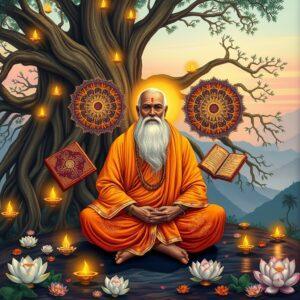
Jain literature stands as a testament to the rich spiritual and philosophical heritage of Jainism, one of India’s ancient religions. This body of work offers profound insights into the core tenets of Jainism, its historical development, and its enduring influence on Indian culture. For those seeking a deeper understanding of this tradition rooted in non-violence (ahimsa), exploring Jain literature is essential.
Historical Significance of Jain Literature
Jainism’s roots trace back to ancient India, possibly even to the Indus Valley Civilization. Its literary tradition evolved over centuries, shaped by the teachings of the Tirthankaras, enlightened spiritual leaders. These teachings, initially transmitted orally, were later compiled into the Agamas, the canonical scriptures of Jainism. These texts flourished during significant historical periods, including the Mauryan (322-185 BCE) and Gupta (320-550 CE) eras, profoundly influencing Indian philosophy, art, and culture.
Key Jain Scriptures
The Agamas form the core of Jain religious texts. These scriptures are categorized into several groups:
- Angas: These twelve texts contain the core doctrines and practices of Jainism. They cover various aspects of Jain philosophy, cosmology, and ethics.
- Upangas: These twelve supplementary texts expand on the Angas, providing further details on specific topics and narratives. They offer a more comprehensive understanding of Jain principles.
- Prakirnakas: This diverse collection of texts addresses a wide range of subjects, including rituals, narratives, and philosophical discussions. They provide a broader perspective on Jain thought.
- Chedasutras: These texts focus on the conduct and discipline of Jain monks and nuns. They outline the rules and regulations for monastic life.
Beyond the Agamas, other significant scriptures include:
- Tattvartha Sutra: This philosophical treatise provides a concise and systematic overview of Jain metaphysics, cosmology, and ethics.
- Kalpa Sutra: This text narrates the lives of the Tirthankaras, emphasizing their exemplary lives and teachings. It provides biographical details and spiritual insights.
- Uttaradhyayana Sutra: This collection of sermons and teachings focuses on moral and ethical principles. It offers guidance on leading a virtuous life according to Jain values.
- Bhagavati Sutra: This extensive text delves into Jain cosmology, metaphysics, and philosophy. It explores complex concepts and provides detailed explanations.
Core Philosophical Themes
Jain literature delves into profound philosophical themes, including:
- Ahimsa (Non-violence): This fundamental principle emphasizes the importance of non-violence in thought, word, and deed. It extends to all living beings.
- Aparigraha (Non-attachment): This principle encourages detachment from material possessions and worldly desires. It promotes a simple and contented life.
- Anekantavada (Multiplicity of Viewpoints): This doctrine recognizes the validity of multiple perspectives and encourages tolerance and understanding. It promotes intellectual humility and open-mindedness.
Other key concepts explored in Jain literature include:
- Karma: Jainism offers a detailed understanding of karma, the law of cause and effect, and its impact on the cycle of birth and death.
- Moksha (Liberation): The ultimate goal in Jainism is moksha, liberation from the cycle of rebirth. Jain literature outlines the path to achieving this liberation.
Influence on Indian Culture
Jain literature has profoundly influenced various aspects of Indian culture, including:
- Art and Architecture: Jain temples and sculptures reflect the aesthetic principles and spiritual values of Jainism. These artistic expressions showcase the rich cultural heritage.
- Language: Jain scholars contributed to the development of Prakrit and Sanskrit, ancient Indian languages. Their literary works enriched these languages.
- Dietary Practices: The emphasis on vegetarianism and non-violence in Jainism has influenced dietary practices in India. This focus on compassion extends to all living beings.
Modern Accessibility and Preservation
Preservation efforts ensure that Jain literature remains accessible in the digital age:
- Digital Formats: Digitization projects have made Jain texts available in formats like PDFs, increasing accessibility for a wider audience.
- Online Platforms: Numerous websites and online libraries host Jain scriptures and related resources, making it easier for people to study and explore Jain teachings.
- Translations: Ongoing translation efforts make Jain literature accessible to a global audience, fostering cross-cultural understanding and appreciation.
Poojn.in: Your Resource for Jain Literature and Ritual Items
For those seeking authentic Jain literature and ritual items, poojn.in offers a comprehensive selection. Explore our collection of Jain scriptures, prayer books, study materials, and more. We also offer a variety of traditional Jain manuscript holders, stands, and book covers to protect these sacred texts. Poojn.in is committed to providing high-quality, authentic resources for your spiritual journey.
You can also find related products such as:
- Lord Shiva Murti: While not directly related to Jain literature, this murti can be a part of your personal devotional practice.
- Mangalam Camphor: Use this camphor for your daily rituals and prayers.
Conclusion
Jain literature offers a profound exploration of a spiritual tradition deeply rooted in wisdom, ethical living, and reverence for all life. By understanding its historical context, key scriptures, and philosophical themes, we can gain a deeper appreciation for Jainism’s contributions to Indian culture and society. The ongoing efforts to preserve and digitize these texts ensure that this rich heritage remains accessible to all, fostering a deeper understanding of this ancient and enduring tradition.


